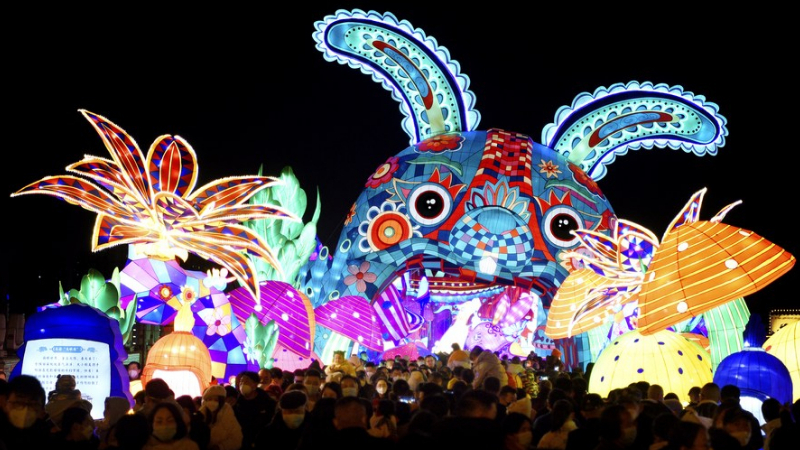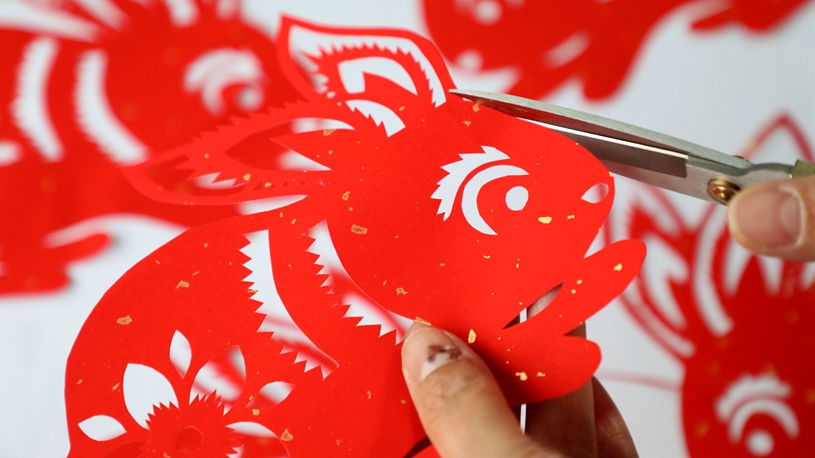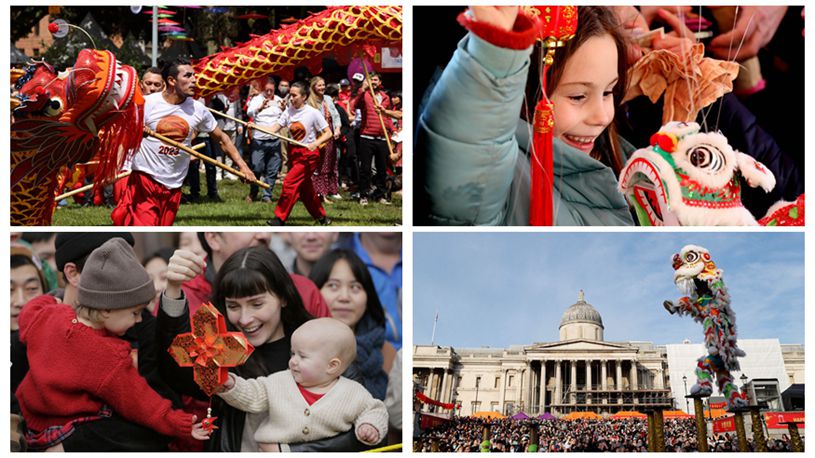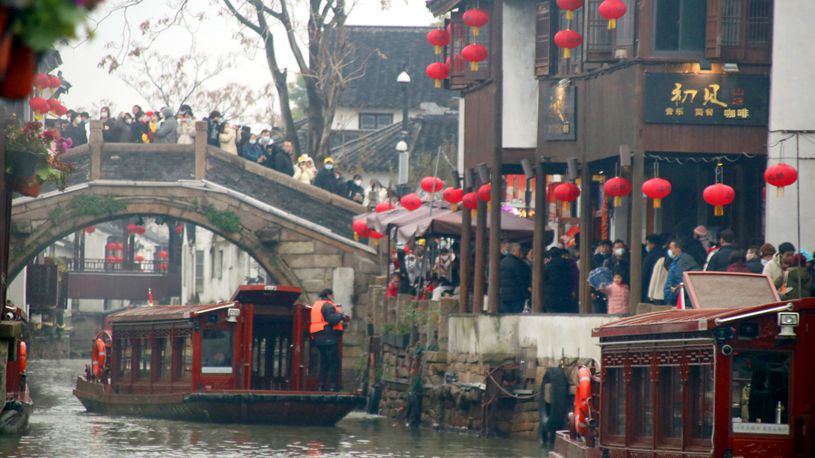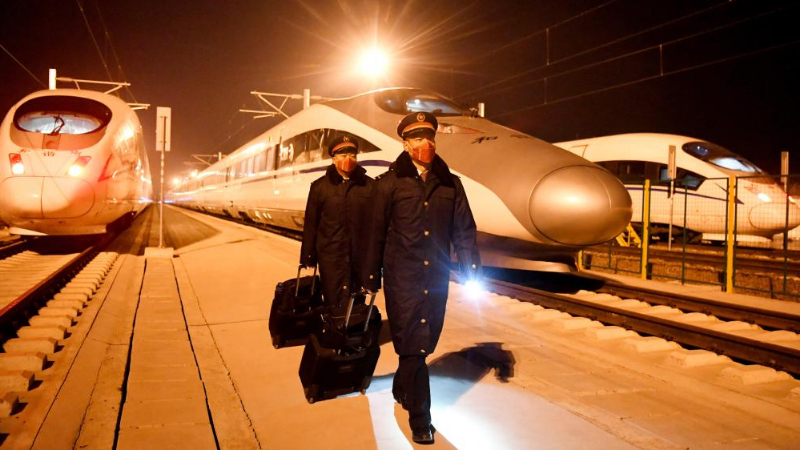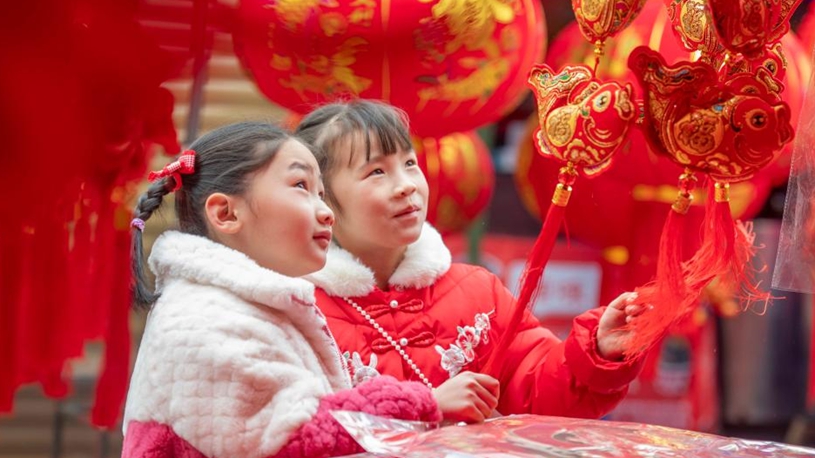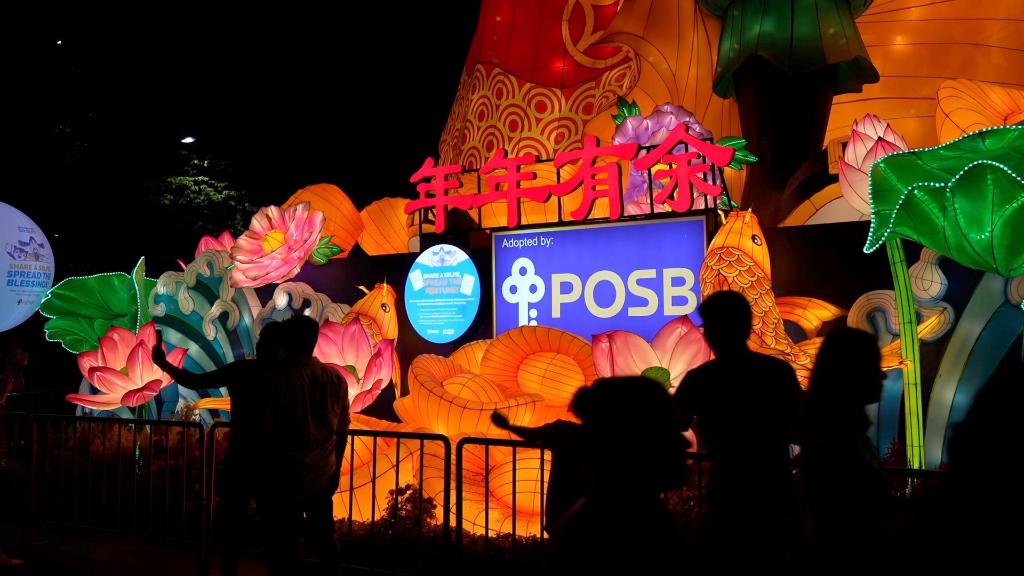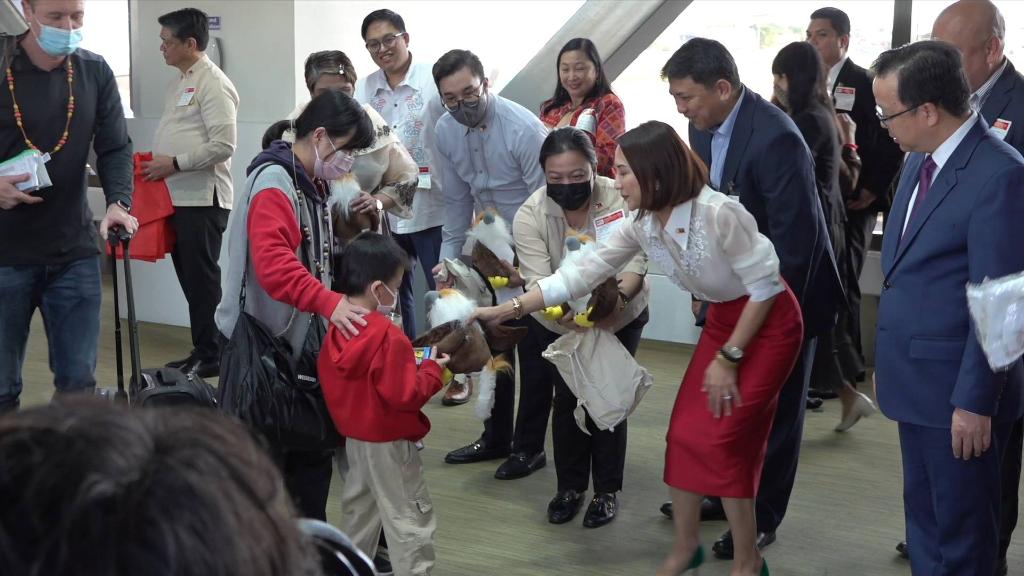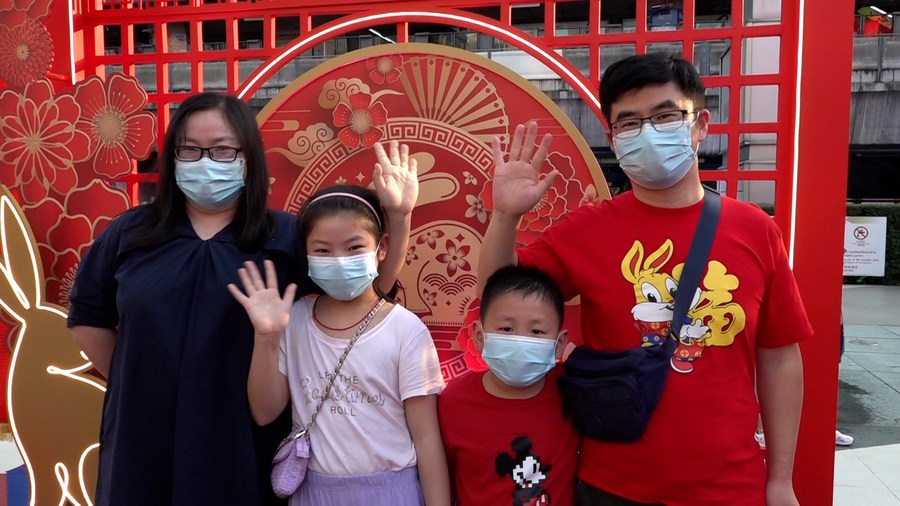
Video snapshot taken on Jan. 20, 2023 shows Chinese tourists posing for photos with a Chinese Lunar New Year decoration outside a shopping center in Bangkok, Thailand. (Thana Nuntavoranut/Xinhua)
In downtown Bangkok, the atmosphere of the Chinese Lunar New Year overspreads, with shopping malls decorated with Chinese New Year elements to attract Chinese tourists during the first "Golden Week" holiday after China optimized its COVID-19 strategy.
BANGKOK, Jan. 26 (Xinhua) -- After a three-year lull, Thailand is welcoming back Chinese tourists to its golden beaches, striking temples and fancy shopping centers, expecting an influx of Chinese tourists to help restore its pandemic-battered tourism sector.
"This is the first trip we travel abroad since the outbreak of the pandemic. We are so excited and happy. We can feel we're so welcomed in Thailand," said Liu Lingling, who came from the city of Wuhan in central China's Hubei Province and planned to spend the Chinese New Year holiday in Thailand.
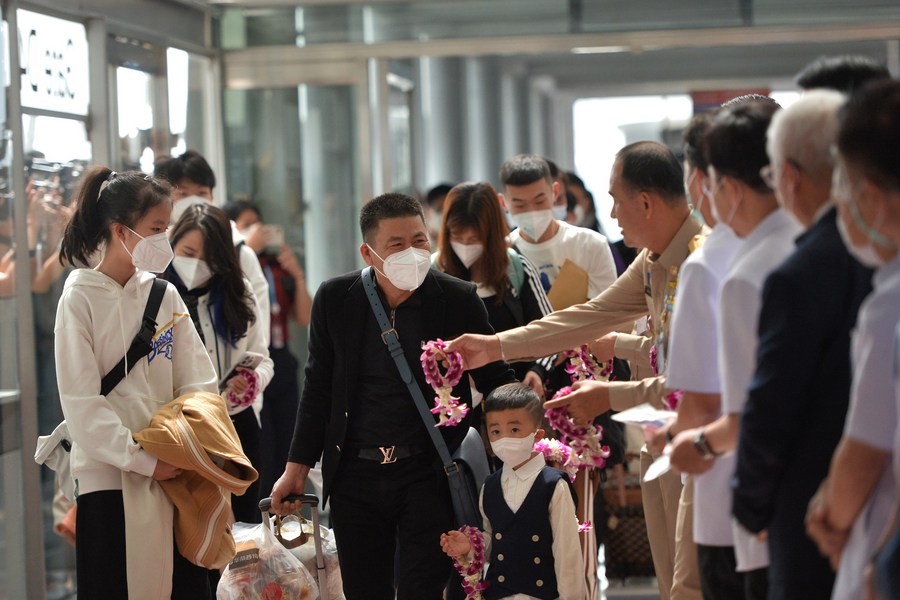
Chinese passengers are welcomed by Thai officials at Suvarnabhumi Airport in Bangkok, Thailand, Jan. 9, 2023. (Xinhua/Rachen Sageamsak)
Liu, whose family would head south to a seaside resort after a few days in Bangkok, was among the legions of Chinese tourists who chose Thailand as the destination for their first outbound travel since China's optimized COVID-19 strategy took effect on Jan. 8.
On Jan. 9, the second day after the optimization, Thai Deputy Prime Minister and Public Health Minister Anutin Charnvirakul and other senior officials welcomed the first group of Chinese tourists at the Suvarnabhumi Airport with flowers and gifts.
The high-profile event reflected the importance Thailand placed on wooing back Chinese tourists to help boost the tourism industry and economic recovery, analysts said.
In downtown Bangkok, the atmosphere of the Chinese Lunar New Year overspreads, with shopping malls decorated with Chinese New Year elements in an effort to cash in on an influx of Chinese tourists during the first "Golden Week" holiday after China optimized its COVID-19 strategy.
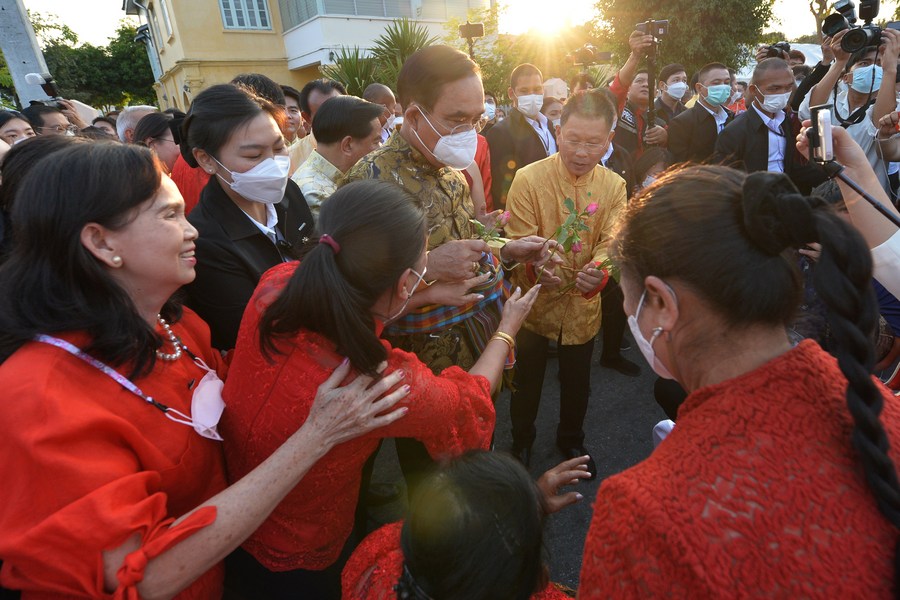 Thai Prime Minister Prayut Chan-o-cha attends a Chinese New Year celebration in Ratchaburi, Thailand, Jan. 19, 2023. (Xinhua/Rachen Sageamsak)
Thai Prime Minister Prayut Chan-o-cha attends a Chinese New Year celebration in Ratchaburi, Thailand, Jan. 19, 2023. (Xinhua/Rachen Sageamsak)
At Chinatown on Bangkok's Yaowarat Road, 200 meters of the road are decorated with lights and lanterns of various styles to celebrate the Chinese Lunar New Year that falls on Jan. 22 this year, the start of the Year of the Rabbit, which Nutthaporn believed would be a year of vitality and prosperity.
"We have stockpiled food supplies for the Chinese New Year travel rush," which always attracts a lot of foreign customers, said Nutthaporn, a chef at a restaurant on Yaowarat Road.
"Chinese tourists are our main driver to the economy. They are back this year, and I think our business will run as good as before the pandemic," he said.
Nutthaporn is not alone in his optimism. Airlines, hotels, restaurants and other tourism operators are looking forward to seeing more Chinese tourists this year.
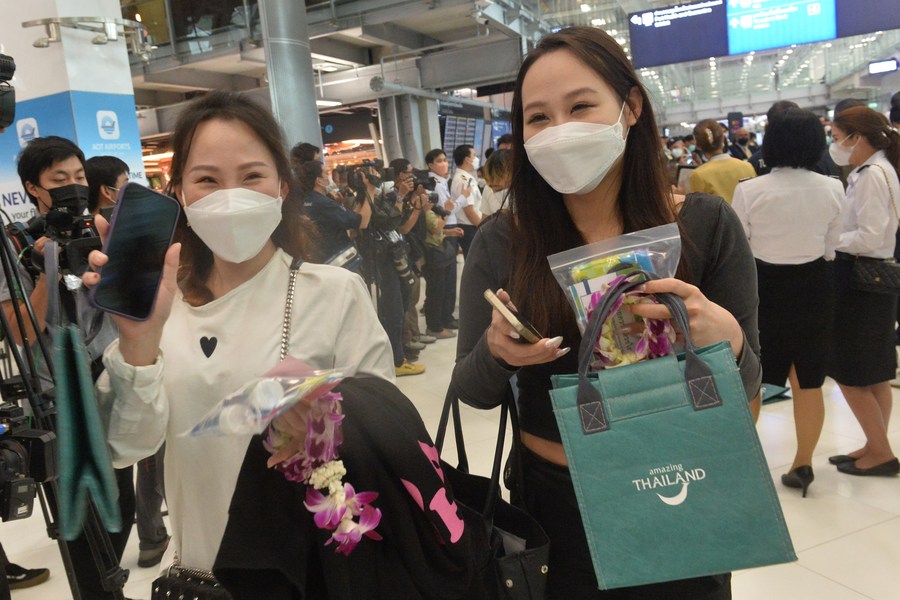 Chinese passengers arrive at Suvarnabhumi Airport in Samut Prakan, Thailand, Jan. 9, 2023. (Xinhua/Rachen Sageamsak)
Chinese passengers arrive at Suvarnabhumi Airport in Samut Prakan, Thailand, Jan. 9, 2023. (Xinhua/Rachen Sageamsak)
"The return of Chinese tourists has raised hope for the recovery of tourism industry in Thailand and other countries around the world," said Wichai Kinchong Choi, senior vice president of the leading Thai Kasikornbank.
Thailand's tourism sector will exhibit a faster recovery following the return of Chinese tourists, said Piti Disyatat, secretary of the Monetary Policy Committee of the Bank of Thailand, the country's central bank.
The Thai economy will continue to gain traction with continued recovery in tourism and private consumption thanks to the return of Chinese tourists, Piti said.
The Thai government is expecting 7 to 10 million Chinese tourist arrivals this year, with 300,000 coming in the first quarter.
The Southeast Asian country welcomed more than 2.24 million international travelers in December alone, compared with only 428,000 for the full year of 2021, taking the total to 11.15 million in 2022, according to Thailand's Ministry of Tourism and Sports.
However, the data still lagged far behind a record of nearly 40 million international tourist arrivals registered in 2019, with Chinese tourists accounting for more than a quarter of the total arrivals.
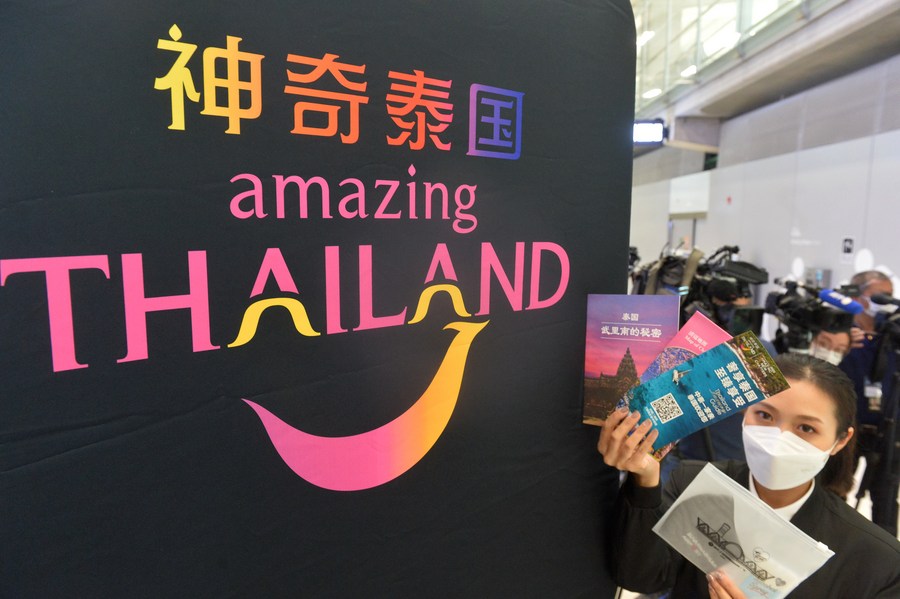 A staff member displays Thailand tourism brochures at Suvarnabhumi Airport in Samut Prakan, Thailand, Jan. 9, 2023. (Xinhua/Rachen Sageamsak)
A staff member displays Thailand tourism brochures at Suvarnabhumi Airport in Samut Prakan, Thailand, Jan. 9, 2023. (Xinhua/Rachen Sageamsak)
"The pandemic has made us realize the importance of Chinese tourists, whose high spending power helped drive our economic growth," Chanapan Kaewklachaiyawuth, vice president of the Thai Chinese Tourism Alliance Association, told Xinhua in an exclusive interview.
Tourists from various countries and regions have come to Thailand, but the lack of Chinese tourists means the lack of vitality and growth momentum, Chanapan said.
It may take time for a full recovery, and "we are excited to see the return of Chinese tourists," Chanapan said, expecting more Chinese tourists to come after China resumes outbound group tours next month.
"We have made a lot of preparation to welcome the return of Chinese tourists, including expanding the range of tourism products, offering more high-end products as well as improving the quality of goods and services," he said. ■

